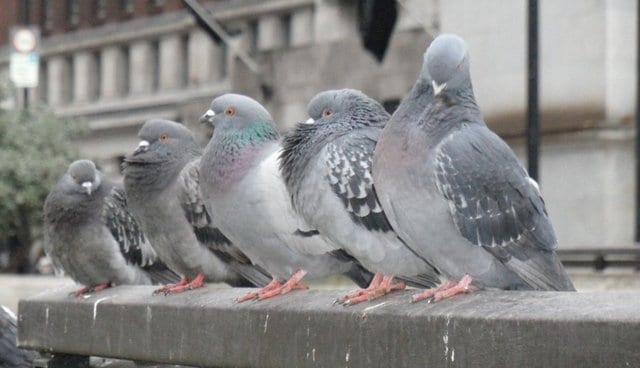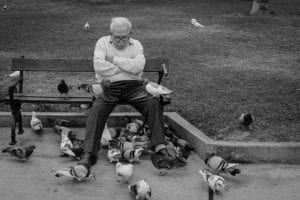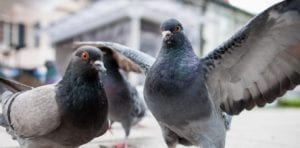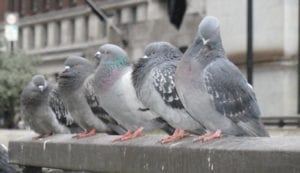
by Pigeon Patrol | Aug 24, 2019 | 4-S Gel Bird repellent, Animal Deterrent Products, Bird Deterrent Products, Bird Netting, Bird Spike, Bird Spikes, Pigeon Control, Pigeon Droppings, Pigeon Patrol's Services, Pigeon Spikes, Pigeons in the News, UltraSonic Bird Control

By Richard Hartley-Parkinson – Friday 9 Aug 2019 6:40 am
Network Rail paid out £28,000 after a passenger ‘possibly slipped’ on pigeon poo at Paddington station. Details of the incident at the west London station – in which the victim hurt their leg – were revealed in response to a Freedom of Information request by the BBC.
A total of more than £950,000 was paid out by Network Rail for 290 claims over the past five years for slips, trips and falls resulting in compensation claims at the 20 stations it manages in England and Scotland.
In some instances this included money towards claimants’ legal costs.
The largest single payout was £40,000 after a passenger ‘slipped on some liquid and landed heavily on their right hip’ at London Charing Cross.
Network Rail’s head of claims and insurance, Philip Thrower, said: ‘We’re a big company that takes our responsibilities seriously. With tens of millions of people using our stations every day; only a tiny fraction of a percent experience a mishap. Horse waits for train on South Shields metro platform
‘If we are at fault for causing damage or injury to anyone, we rightly compensate them for those accidents and put in place new ways of working to stop them from happening again.’
Other accidents which led to successful compensation claims include:
- A passenger slipped on an uneven surface while walking towards a train at Euston (£17,000);
- A large puddle of water caused a passenger to slip while crossing a bridge at Leeds station (£10,000);
- A passenger slipped on ‘discarded tomato sauce’ on the concourse at London Liverpool Street, hurting their wrist and both knees (£6,000).
Victoria station in London was the location for the most successful claims, with 44. This was followed by London Waterloo and Leeds (both 32), Euston (27) and Liverpool Street (24). The lowest amount paid was £10 after a passenger suffered ‘personal injury and damage/messing to suit’ when they slipped on ice at an entrance to Victoria.
Read more: https://metro.co.uk/2019/08/09/paddington-station-passenger-gets-payout-slipping-pigeon-poo-10543253/
Have a Pigeon Problem?
Pigeon Patrol Products & Services is the leading manufacturer and distributor of bird deterrent (control) products in Canada. Pigeon Patrol products have solved pest bird problems in industrial, commercial, and residential settings since 2000, by using safe and humane bird deterrents with only bird and animal friendly solutions. At Pigeon Patrol, we manufacture and offer a variety of bird deterrents, ranging from Ultra-flex Bird Spikes with UV protection, Bird Netting, 4-S Gel and the best Ultrasonic and audible sound devices on the market today.
Voted Best Canadian wholesaler for Bird Deterrent products eight years in a row.
Contact us at 1- 877– 4– NO-BIRD, (604) 585-9279, or visit our website at www.pigeonpatrol.ca

by Pigeon Patrol | Mar 31, 2019 | 4-S Gel Bird repellent, Animal Deterrent Products, Bird Deterrent Products
Occasionally, you see them munching on a pizza rind or some other recognizable discarded food, but most of the time they seem to be pecking at nothing at all.
I am not planning to start a pigeon Facebook enterprise, but unlike virtually all New Yorkers, I do not loathe pigeons and give them credit for living a tough life on the mean and unforgiving streets of Manhattan.
And if you actually stop and look at them, which no one does, their plumage can be quite striking. Yes they are plump and the neck-snapping walk is mind-boggling — what evolutionary rationale could that possibly have? — but they demonstrate an unrelenting pluck to survive in the city that I find admirable.

Just like seagulls, you never see a young or old pigeon, and never a sickly one. They are all the same size and seem in excellent health. I’ve never seen a dead pigeon or a squished one, which is remarkable for all their bicycle- and car-dodging. Not to overthink this, for all of their daily vicissitudes they seem pretty content with their lives, although their expressionless faces could be masking all kinds of nameless dreads.
One activity that seems to definitely give them great pleasure is communal flight. As I look east from our 16th floor apartment, I often see sizable flocks of pigeons soaring in synchronized movements that have no purpose, just banking, turning this way and that, diving and climbing.
They are clearly playing. They will, as a group, alight on a random rooftop, cogitate for a while and then set off on another flight maneuver, happy as clams.
If there is an afterlife, this playful flying would not make me elect to come back as a pigeon. I’m on record as choosing to come back as a chickadee. But if I have no choice and I’m forced to come back as a pigeon, I could handle it. The key, it seems, is a sufficient stream of pizza rinds.
Seagulls seem a lot like pigeons. They are always scamming for food and can fly beautifully. They seem smarter than pigeons and have a more sculpted shape. Gratefully, they have eliminated the disturbing neck-snapping walk, and they are artful at catching food thrown at them by the bored human denizens of Crescent Beach.
Which brings me to a seagull story. It is a third-hand story and its veracity cannot be verified. It was told to me by my nephew on Cape Cod, and he is a known embellisher. There is a thin line between embellishment and prevarication, and I am pretty sure he was sticking to the embellishment side. Not betting my life on that, however.
It starts with a surf-casting fisherman and a nearby observing seagull. The seagull watches as the surf-caster baits up his hook and heaves it into the waves. This is repeated several times with no success, fish-catching-wise. This is where it gets interesting.
This story wants you to believe that a light goes on in the observing seagull’s brain. The light says one, there is food being flung into the air and two, I can fly. Ergo, an intercept is entirely possible. But the light does not fully grasp the concept of “fish hook.”
You probably see where this is going. A perfectly timed intercept is made and the hook lodges in the seagull’s beak, surprising both human and bird actors in this story.
Embellishment alert: The fisherman starts reeling in the seagull and eventually gets it on the beach where a concerned woman assists the fisherman to calm the seagull while he fetches his needle-nose pliers to extract the hook. The seagull is not pleased, and it takes a while to wrestle the hook out.
A moment passes as the humans and seagull digest what just happened. Another light goes on in the seagull’s brain. With good intentions, the concerned woman is carefully holding the seagull but gets no credit for this act of kindness. The light says take a nip of the woman’s cheek and get the heck out of here. End of story.
True story? We cannot be sure.
But it sure beats any pigeon story I know.
Bird Gone, Pigeon Gone, Pigeon problems, pigeon spikes, 1-877-4NO-BIRD, 4-S Gel, Bird Control, Pigeon Control, bird repellent, Bird Spikes, sonic bird repellent, stainless steel bird spikes, bird spikes Vancouver, Ultra Sonic Bird Control, Bird Netting, Plastic Bird Spikes, Canada bird spike deterrents, Pigeon Pests, B Gone Pigeon, Pigeon Patrol, pest controller, pest control operator, pest control technician, Pigeon Control Products, humane pigeon spikes, pigeon deterrents, pigeon traps, Pigeon repellents, Sound & Laser Deterrents, wildlife control, raccoon, skunk, squirrel deterrent, De-Fence Spikes, Dragons Den.

by Pigeon Patrol | Mar 31, 2019 | Bird Netting, Pigeon Spikes, Pigeons in the News, UltraSonic Bird Control
WOLCOTT — Someone discarded 145 living pigeons this winter the way one throws out an empty disposable coffee cup — by tossing them into a trash dumpster.
The night caretaker at the northbound Interstate 65 rest area in White County found the first 57 birds in the middle of December as he took the trash out, said Kim Hoover of the Hoots to Howls Wildlife Rehabilitation Center in rural Pulaski County. Some of the birds trapped inside boxes died, she said.
She took the birds and found homes for most of them, keeping the blind and crippled birds at the rehabilitation center.
Then on Feb. 28, the caretaker found more boxes of birds in the same dumpster at the same rest area.
“Same mozzarella cheese boxes. Same person’s name and number on the leg ban,” she said.
The first group of birds found were standing in feces that were caked to their feet and matted in their feathers, Hoover said. It appeared they’d been in the dumpster for a while and were in poor health.
The second group was found in better condition and did not have trash piled on top of the boxes, indicating that they had not been in the dumpster that long, Hoover said.
That person’s name on the leg band is Bahman Ghassab from Dublin, Ohio, Hoover said. The bands also had a telephone number to reach Ghassab. The Journal & Courier called that number on Wednesday, but it is no longer a working number.
But after the find in December, Hoover said one of her associates did call the number, and Ghassab answered.
“He said he sold some birds to someone in Florida and in Illinois,” Hoover said, “and he would not give any more info than that.
“When asked why would you sell sick starving and injured pigeons and better yet why would someone buy them in this condition, the conversation ended,” Hoover said.
The Journal & Courier contacted John DeCarlo Jr., president of the National Pigeon Association. He checked the association’s membership list, and Ghassab is not a member.
“These birds don’t fly,” Hoover said.
The Journal & Courier texted photos of the birds to DeCarlo, who is in California.
“I don’t know why they don’t fly,” he said, noting this particular breed of pigeon is the Iranian high fliers.
The Iranian high fliers are capable of flight, unlike the one particular breed that Hoover mistakenly was told the rescued birds belonged to, DeCarlo said.
The birds might not fly because they are sick or are under fed or are under conditioned, DeCarlo said. Or they might have been altered so they can’t fly, he added.
Someone told Hoover the birds were likely part of an illegal gambling ring, but that doesn’t seem likely, according to DeCarlo.
The only gambling in the pigeon hobby is among racing pigeons, and these are not racing pigeons, he said.
The flightless pigeon breed is known as parlor rollers. They have been genetically bred not to fly, and when they are nervous or excited, they roll, Decarlo said. There is a competition among parlor rollers to see whose bird can roll the furthest, but it’s not cruel because this is the natural way these birds behave, according to several pigeon experts interviewed Wednesday by the Journal & Courier.
Everyone interviewed Wednesday was incensed by the way these birds were discarded.
Hoover said no one seems interested in investigating it as a criminal case.
“From what I’m told, they’re not pets; they’re not farm animals, so nobody does anything,” she said.
National Pigeon Association Secretary/Treasurer Tim Heidrich of Georgia doesn’t see why it couldn’t be prosecuted.
“To me, it’s like animal cruelty,” Heidrich said. “There are ways to get rid of them without being cruel about it.”
“There are quite a few small shows,” he said. “You can go to these things and sell them — give them away to the kids.”
DeCarlo suggested giving unwanted pigeons to 4Hers so they can learn the hobby and show them.
Finding so many birds thrown away begs the question of whether other birds met with a similar fate only went undiscovered at other locations.
“We don’t know if this is the first time,” Hoover said. “Is it happening at other rest parks? We don’t know.
“I just wish he’d stop. These birds don’t deserve to be thrown out.”
Bird Gone, Pigeon Gone, Pigeon problems, pigeon spikes, 1-877-4NO-BIRD, 4-S Gel, Bird Control, Pigeon Control, bird repellent, Bird Spikes, sonic bird repellent, stainless steel bird spikes, bird spikes Vancouver, Ultra Sonic Bird Control, Bird Netting, Plastic Bird Spikes, Canada bird spike deterrents, Pigeon Pests, B Gone Pigeon, Pigeon Patrol, pest controller, pest control operator, pest control technician, Pigeon Control Products, humane pigeon spikes, pigeon deterrents, pigeon traps, Pigeon repellents, Sound & Laser Deterrents, wildlife control, raccoon, skunk, squirrel deterrent, De-Fence Spikes, Dragons Den.

by Pigeon Patrol | Mar 31, 2019 | Bird Deterrent Products, Bird Netting, Pigeon Patrol's Services, Pigeon Spikes, Pigeons in the News
BOSTON — Along with all the usual declarations and deductions, Massachusetts residents have been asked to keep something else in mind this tax season: pigeon droppings.
In an unusual and at times stomach-turning appeal, the state agency MassWildlife proposed that one way to fight back against the sticky messes befouling cars and damaging bridges is for taxpayers to check a box on their tax forms to support the state’s endangered species program.
How so? Peregrine falcons are among the program’s beneficiaries, and they prey on pigeons.
“Hate pigeon poop? Save peregrine falcons,” begins the message on the agency’s website and in a recent newsletter. It goes on to picture a typical motorist driving home from work over one of the state’s major bridges.
 “You’re thinking about dinner as you wait in traffic when — PLOP! — something white and black falls onto your windshield,” the post continues.
“You’re thinking about dinner as you wait in traffic when — PLOP! — something white and black falls onto your windshield,” the post continues.
Next comes a scientific breakdown of the bird droppings that includes an explanation — for inquiring minds that need to know — of the precise difference between the dark and white portions.
Damage: And then, lest the reader believe it’s all no more than a yucky nuisance, this warning: “This paste-like substance is so acidic and corrosive, that it can damage your car’s paint job. And you guessed it, groups of birds all going to the bathroom in the same place can make man-made structures like bridges deteriorate faster.”
Enter the peregrine falcon, a magnificent predator that can attain speeds of 240 mph in high-elevation dives, no match for the slower and less agile pigeon, which just so happens to be one of the peregrine’s favorite feasts.
Peregrine falcons disappeared from Massachusetts in the mid-1950s and soon after in the entire eastern U.S., their demise largely blamed on the pesticide DDT, according to the state’s Natural Heritage and Endangered Species Program.
After the chemical was banned, efforts picked up to reintroduce the raptor, sometimes confused with more common varieties of hawk.
Pigeon-hunting perches: To the surprise of some ornithologists, many of the newcomers eschewed their former rural habitats and became city dwellers. Instead of on cliffs, they began nesting on tall building ledges and bridges in urban areas where food sources — pigeons, especially — were more plentiful.
To help the falcons along, state officials and volunteers placed nesting boxes in strategic locations such as the Custom House Tower in Boston, the 28-story W.E.B. Du Bois Library at the University of Massachusetts-Amherst and the heavily traveled Tobin Bridge spanning the Mystic River.
“Falcon cams” were even installed to offer a continuous livestream of peregrine comings and goings.
The restoration effort is partially funded by voluntary donations from taxpayers, who can choose to contribute to “endangered wildlife conservation” on their state returns. The money supports more than 400 threatened or endangered plants and animals, from bog turtles to timber rattlesnakes, but the peregrine falcon is easily among the most “charismatic,” said David Paulson, senior endangered species biologist for MassWildlife.
Donations: Contributions to the fund have been increasing but remain well below levels needed, according to state officials and wildlife experts. About 23,000 taxpayers gave $312,000 through the tax check-off in 2017, the last full year for which figures were available, compared with the $178,000 provided by approximately 18,000 taxpayers in 2013.
It’s not just bird lovers and conservationists embracing the slow but steady revival of the peregrine falcons.
State transportation engineers have noticed a reduction in the pigeon population on bridges with nesting falcons, officials said. Fewer pigeons means less waste building up on bridge surfaces, rusting the steel and increasing the costs for maintenance and bridge replacement.
“It’s almost like a symbiotic relationship,” Paulson said. “The structure provides the habitat, and the falcons kind of provide the pest management, for lack of a better term.”
Officials hope drivers when completing their tax forms will see the peregrine as a feathered friend that can make an unwanted splattering a bit less likely.
The falcons “are never going to eliminate (pigeons), but they can help to manage them,” Paulson said.
Bird Gone, Pigeon Gone, Pigeon problems, pigeon spikes, 1-877-4NO-BIRD, 4-S Gel, Bird Control, Pigeon Control, bird repellent, Bird Spikes, sonic bird repellent, stainless steel bird spikes, bird spikes Vancouver, Ultra Sonic Bird Control, Bird Netting, Plastic Bird Spikes, Canada bird spike deterrents, Pigeon Pests, B Gone Pigeon, Pigeon Patrol, pest controller, pest control operator, pest control technician, Pigeon Control Products, humane pigeon spikes, pigeon deterrents, pigeon traps, Pigeon repellents, Sound & Laser Deterrents, wildlife control, raccoon, skunk, squirrel deterrent, De-Fence Spikes, Dragons Den.

by Pigeon Patrol | Mar 31, 2019 | Bird Deterrent Products, Bird Netting, Pigeon Patrol's Services, Pigeon Spikes
Don’t bet against the high-flying lifestyle of rare bird and sports.
A buyer has bid more than $1.4 million for a champion Belgian racing pigeon in a sale, according to the auction house Pipa, which oversaw the online auction for the rare bird.
This regal, emerald green-feathered bird is no regular pigeon you would frequent on the street — as you probably imagined.
In fact, lest you underestimate the athleticism of the mighty bird named “Armando,” look no further than this endorsement.
Nikolaas Gyselbrecht, the founder and chief executive of Pipa, told the Press Association: “This pigeon has a race record that has never been matched by any other pigeon.”
“In football terms you have Messi and Ronaldo – it’s that level.”
The praise for “Armando” continued from there.
“This is a crowning glory of all those years in the pigeon sport. The icing on the cake,” Joël Verschoot said of the unique bird he put up for auction, according to the Guardian.
Indeed, Armando is apparently a champ who really goes the distance.
As to why a bird fetched such a high price, it comes down to Armando’s particular knack for the long-distance competition in China, where bird racing is a popular draw.
Bird owners can win plenty of their money back by betting on the correct winged competitor, with prizes in the tens of thousands of dollars.
That being said, your typical racer bird fetches $2,838, according to the BBC.
“This type of champion is rarely offered for sale,” according to the auction site. The high price leapt from $600,000 to $1.4 million in the final moments of bidding, according to the auction site, which features a close-up snapshot of the bird’s eye for reasons unknown.
Go Armando.
Bird Gone, Pigeon Gone, Pigeon problems, pigeon spikes, 1-877-4NO-BIRD, 4-S Gel, Bird Control, Pigeon Control, bird repellent, Bird Spikes, sonic bird repellent, stainless steel bird spikes, bird spikes Vancouver, Ultra Sonic Bird Control, Bird Netting, Plastic Bird Spikes, Canada bird spike deterrents, Pigeon Pests, B Gone Pigeon, Pigeon Patrol, pest controller, pest control operator, pest control technician, Pigeon Control Products, humane pigeon spikes, pigeon deterrents, pigeon traps, Pigeon repellents, Sound & Laser Deterrents, wildlife control, raccoon, skunk, squirrel deterrent, De-Fence Spikes, Dragons Den.








